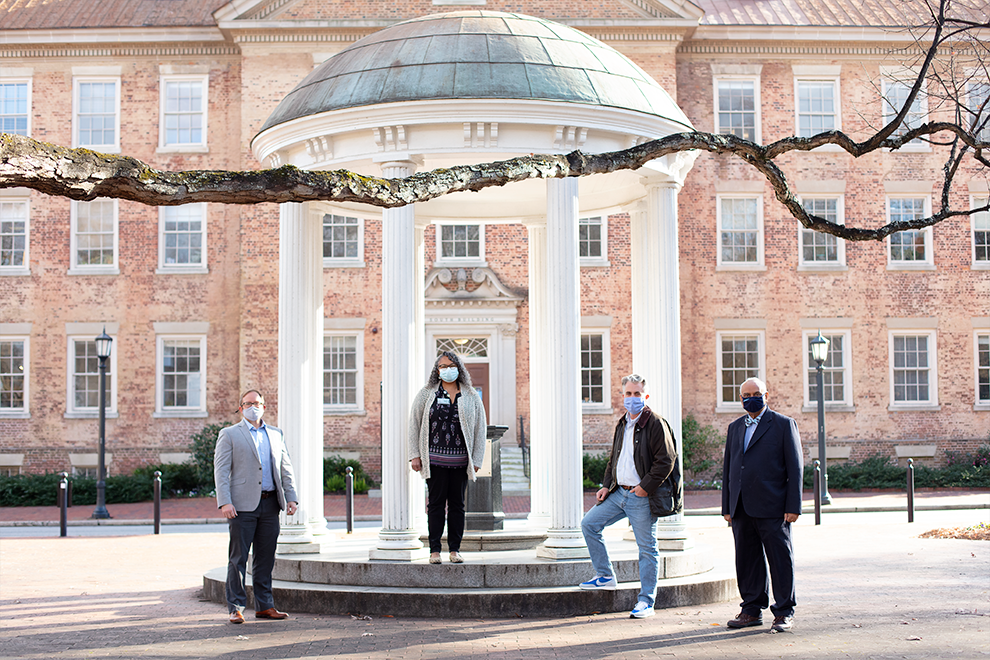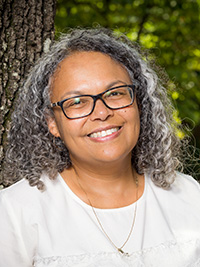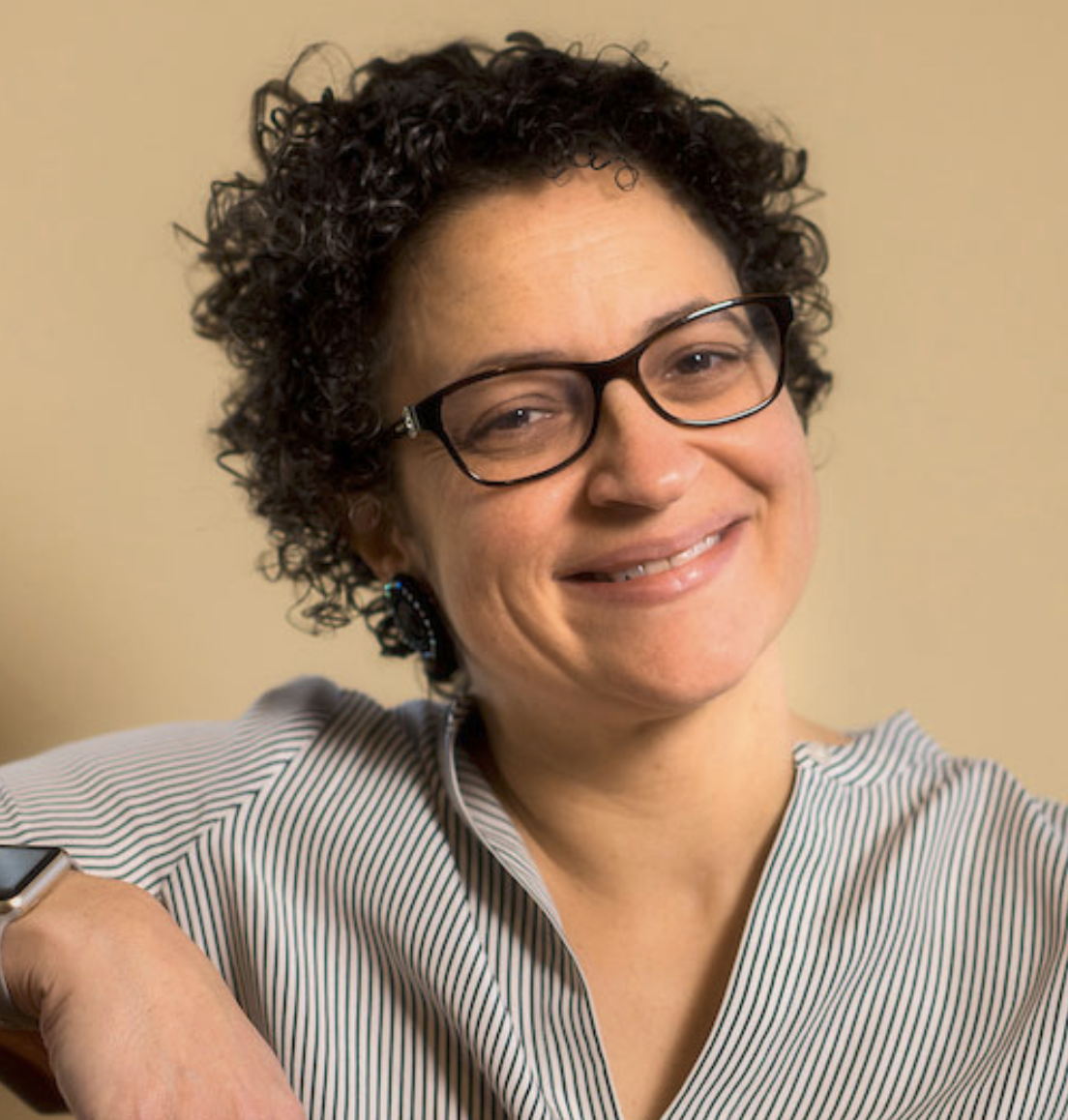Image from left to right: Jason Cramer, Director of Experiential Professional Development, Suzanne Barbour, Dean of the Graduate School, Jeffrey Warren, Executive Director of the NC Policy Collaboratory, and Deb Aikat, Associate Professor, Hussman School of Journalism and Media. Not pictured: Malinda Maynor Lowery, professor of history and director of the Center for the Study of the American South.
What started out as thoughtful conversation between University of North Carolina at Chapel-Hill colleagues on the 2019 Tar Heel Bus Tour has turned into a successful pilot program that engages communities through data science, public policy and service to address community-specific needs during the COVID-19 pandemic.
United not only by the Bus Tour but also in the mindset to bolster communities across the state, five colleagues and fast friends are helping UNC-Chapel Hill graduate students strengthen local communities by providing relevant and time-sensitive data to legislators and other leaders across North Carolina to help guide the continuing and future pandemic response.
Sponsored by the UNC-Chapel Hill Graduate School, Southern Futures Initiative, and the North Carolina Policy Collaboratory, which was established by the North Carolina General Assembly (NCGA) in 2016 to deploy the collective research and policy expertise of UNC System faculty and staff for practical use, the I4 Boundary Spanners launched as a focused, six-month program this past summer (the four Is being Include, Identify, Investigate and Influence). The program is one of more than 85 research projects underway across 14 UNC System schools. Funded by a $29 million appropriation by the NCGA to the Collaboratory in May 2020, the funding supports research on treatment, community testing and prevention of COVID-19. I4 Boundary Spanners is among a subset of 15 faculty projects – from among the 45+ total Collaboratory-funded COVID projects at UNC-Chapel Hill – that is working with Innovate Carolina and the Institute for Convergent Science to apply a rapid innovation methodology designed to speed its results.
The mission of the program is to train a diverse group of Carolina graduate students as I4 Boundary Spanners: students who appreciate and can mobilize the dataverse to empower their communities to include, identify, investigate and influence around issues that impact their physical, environmental and economic health. A group of five faculty united to create and launch the I4 Boundary Spanners pilot program:
- Deb Aikat, associate professor at the Hussman School of Journalism and Media
- Suzanne Barbour, dean of the Graduate School and professor of biochemistry and biophysics at the School of Medicine
- Jason Cramer, director of experiential professional development for The Graduate School
- Malinda Maynor Lowery, professor of history and director of the Center for the Study of the American South
- Jeff Warren, executive director of the North Carolina Policy Collaboratory and adjunct associate professor of geological sciences
Within the I4 Boundary Spanners program, part of the training that graduate students receive is focused on humanistic skills. Graduate students benefit from working across disciplines and centering stories of how policy impacts real people. Students are not just working with quantitative data but also with qualitative data leverage the power of people’s stories to affect change in their communities.
“I4 Boundary Spanners is all about the synergies built from conversations, which underscores what the NC Policy Collaboratory strives to be,” says Warren. “I love talking to legislators about the power that can be harnessed across the UNC System, working together across disciplines. That’s really important and what’s been missing from a lot of physical science research…the people quotient.”
For example, most legislators as well as the general public may see a science policy report as just numbers and graphs. But if those reports include historical interviews, video snippets of constituents, and the importance of a community issue to its residents, this combination of added elements adds texture that illustrates the applicability and impact of science to the real world in ways that raw data cannot.
The idea for I4 Boundary Spanners was sparked with the release of a report by the Committee on Equal Opportunities in Science and Engineering (CEOSE), which is a congressionally mandated advisory committee to the National Science Foundation (NSF) suggesting more can be done by the NSF in the space of community-engaged research as a way to enhance scientific pipelines and broaden participation.
“More and more, we’re seeing taxpayers who don’t trust science and don’t necessarily want to underwrite science,” says Barbour. “By putting students in the community where they can be the face of science, we have the opportunity to make science more approachable, more palatable, and hopefully more valued by communities.”

“More and more, we’re seeing taxpayers who don’t trust science and don’t necessarily want to underwrite science…by putting students in the community where they can be the face of science, we have the opportunity to make science more approachable, more palatable, and hopefully more valued by communities.”
– Suzanne Barbour
Around this time, Barbour and Lowery re-connected over a Zoom meeting where they were learning about disparate impacts of COVID-19 across the state. On another part of campus, Warren and Lowery were talking about oral history and policy making over the past few years. Oral history methodologies and research can assist communities that have particular kinds of consensus issues that require collective problem solving.
As these conversations converged after that Bus Tour, a faculty supergroup emerged – one committed to figuring out how to translate the power of students working with data into community-driven research.
Along with Barbour and Lowery, Warren’s background in science policy as well as serving as executive director of the NC Policy Collaboratory, Cramer’s broad experience in experiential professional development, and Aikat’s expertise in the role of digital media in the global sphere, this team put together a pilot program that would meet the needs of Carolina graduate students and the community – all for the greater good of North Carolina and beyond.
“By leveraging the wisdom of communities to ensure the response to COVID-19 is appropriate and tailored to meet their needs, I4 Boundary Spanners is not only igniting the conversation, it is igniting the communication needed with communities during this pandemic,” says Aikat.
“The I4 Boundary Spanners approach represents the University’s – and The Graduate School’s – ability to mobilize resources and talent across disciplines to simultaneously support communities and real-world learning for graduate students,” says Cramer. “The recent launch of this program was timely, given the impact of the pandemic on North Carolina communities, but the approach is also important because it helps students to strengthen their communication, teamwork, and data skills and apply these skills to empower communities to solve community problems. This is a fantastic experiential professional development opportunity for graduate students.”
The program emphasizes partnership on various, multidisciplinary levels at the University – with collaboration between students from departments in the College of Arts and Sciences, the Gillings School of Global Public Health and the School of Social Work. These collaborations are strengthened further by principal investigators who have received support from the Collaboratory to conduct COVID-19-related projects and who offer different areas of expertise.
“With multidisciplinary collaboration, groups can’t always immediately jump into the same terms of engagement. They have to collectively wrestle with what kinds of principles, assumptions and operating methods they will use in ongoing conversations,” says Lowery. “Community collaboration starts with self-reflection, knowing who your community is and being able to work in proximity to the people most affected by a problem. Although your training and expertise is useful, you have to think outside the bounds of your training. It’s only the beginning, and so the I4Boundary students are practicing that with each other.”

“With multidisciplinary collaboration, groups can’t always immediately jump into the same terms of engagement. They have to collectively wrestle with what kinds of principles, assumptions and operating methods they will use in ongoing conversations.”
– Malinda Maynor Lowery. Image by Jon Gardiner.
To ensure the I4 Boundary Spanners students were able to hit the ground running with their projects, they were treated to an Innovate Carolina design thinking session led by Liz Chen, assistant professor of health behavior and Innovate Carolina’s design thinking lead. The session helped students think through their project solutions by examining the human need and then working through a creative process to find a solution that would be desirable, feasible and viable to meet that need.
“Millennial graduate students want to make an impact now, not 20 years from now,” adds Barbour. “They want to see direct impact of the things they’re working on now, ultimately seeing results in something that makes a difference.”
Already, the impact of the program reaches far and wide for both the scholars and the communities that they’ve worked with. The program can also enhance the overall educational experience for Carolina graduate students.
“Increasingly, our graduate students are expressing interest in career paths outside of academia,” says Barbour. “The I4 Boundary Spanners program allows our graduate students to not just use their technical skills but their people skills as well to get into communities and make a difference. That’s a big selling point for this program.”
More than 40 graduate students applied, with six scholars chosen to participate. Throughout the pilot program, the leadership team regularly met with the scholars to assess their progress, provide guidance and mentorship, and exchange best practices.
“We met regularly with our scholars to celebrate their innovations but to also talk through problems or setbacks they faced,” says Aikat. “It’s like baptism by fire. We are learning every week and have an appreciation that every project cannot have everything going well and positive. You have setbacks that you have to overcome, and that’s part of the learning experience.”
The six I4 Boundary Spanners scholars and their projects are:
- Wesley Hamilton, doctoral student in mathematics, for the project COVID-19: Commerce with Confidence’ Simulator.
- Jazmyne Jones, master’s degree student in social work, for the project Understanding Workers’ Transition to New Digital Labor Jobs.
- Andreina Malki, doctoral student in geography, for the project Testing the Keys to NC’s Economic Recovery.
- Rumana Rabbani, doctoral student in health policy and management, for the project Gearing Up: The Response of Manufacturing Extension to the COVID-19 Pandemic.
- Luke Carmichael Valmadrid, master’s degree student in public health (health equity), for the project Policy and Policy Communication in Polarized Times.
- Cason Whitcomb, master’s degree student in public health (health behavior), for the project Supporting Adolescents with Suicidal Thoughts and Behaviors in the Context of COVID-19.
As the pilot wraps up December 30, 2020, the scholars are sharing their experiences and key accomplishments with the leadership team as well as perceived impact within their communities. Because of the pilot’s success, the I4Boundary Spanners leadership team has applied for a grant to continue and expand upon the work of the I4Boundary Spanners program into 2021 as a multi-University collaboration across the UNC system.
“Many UNC graduate students don’t know what options are out there to engage with the community, including options around policy and media and in public-facing science,” adds Barbour. “I think it’s really important for students to have that perspective.”

 | UNC-CH
| UNC-CH




